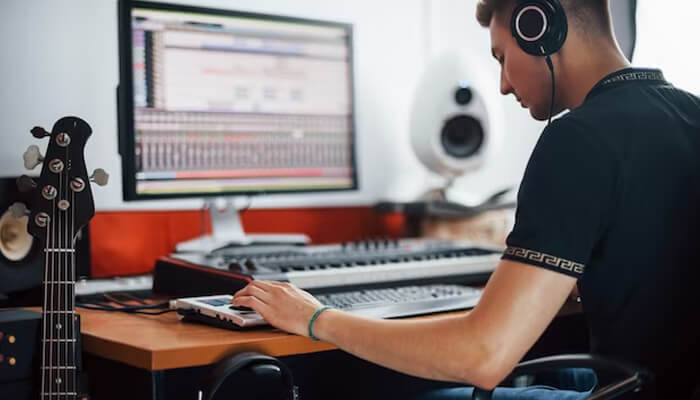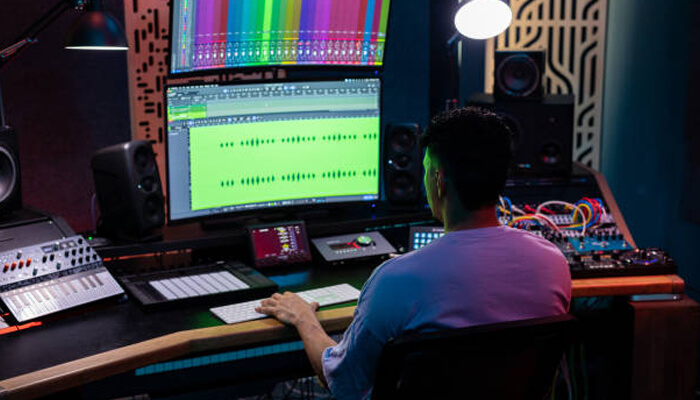Audio mastering represents the conclusive phase within the music production journey, signifying the post-production endeavor dedicated to enhancing the music and priming it for distribution in the music industry. Mastering a song means adding the finishing touches to a mix and enhancing specific sonic qualities. This includes tasks like level adjustments, stereo enhancements, and checking for distractions like clicks and pops. The outcome is a polished, pristine sound optimized for seamless playback across various formats and systems.
Pursuing a well-designed music production course helps aspiring professionals attain expertise in advanced music production by fostering the creation of a substantial body of original work that showcases a unique artistic identity. Moreover, the music industry is constantly evolving, driven by technological changes and consumer behavior.
Mastering music production is necessary to create that “finished” sound you hear every day in everything from television commercials to radio and streaming. Additionally, mastering guarantees uniform volume levels across tracks within an album or EP, enhancing the overall listening experience. You can enjoy an entire album without adjusting the volume between songs.
Mastering readies your music for distribution. This process involves converting sample rates, reducing bit depth, and arranging tracks within an album or EP, including essential metadata. The finalized master file is subsequently dispatched for distribution and future reproductions.
During mastering, an audio engineer refines and optimizes the song or album. This involves intricate processes to ensure the music sounds its best across various playback systems and formats. Let’s delve into the aspects that make mastering music production important:
1. Enhanced Clarity and Definition
Your musical creations transform the mastering process, emerging with newfound clarity and precision. Mastering engineers employ techniques, including EQ adjustments and noise reduction, to achieve this. The result is music that cuts through the mix with remarkable clarity, ensuring a captivating listening experience for your audience.
2. Optimal Loudness Compliance
If you envision your music receiving airplay or streaming on popular platforms like Spotify, adhering to specific loudness standards becomes imperative. Mastering facilitates attaining the ideal loudness level for your music to shine.
3. Enriched Stereo Imaging
Mastering can also be a conduit for enhancing the stereo imaging of your compositions. Stereo imaging refers to the perception of width and depth within the soundscape. A well-mastered track exudes a spacious, expansive stereo image, while a poorly mastered one can sound confined and narrow. This enhancement empowers your music to sound fuller and more immersive, especially advantageous for genres relying heavily on effects processing, such as electronic music.
4. Noise Reduction
Excessive noise is a common nemesis of poorly mastered tracks, arising from various sources like microphone hissing, clicks, pops, or digital artifacts. A proficient mastering engineer can identify and diminish noise levels, producing cleaner and more professional-sounding music—a necessity for commercial releases.
5. Dynamic Range Control
Dynamic range compression is a prevalent mastering technique that evens out the loudness disparities within your music, imparting a more radio-friendly quality. This process also aids in narrowing the overall dynamic range, enhancing the consistency and punchiness of your tracks—particularly valuable for genres intended for high-volume playback, like dance music.
6. Precision EQ Adjustments
Equalization (EQ) represents another indispensable tool in the mastering arsenal. By fine-tuning the frequency spectrum of your music, EQ adjustments cater to the attainment of your desired sonic profile. Whether enhancing specific frequencies for clarity and balance or rectifying low-end muddiness or high-frequency harshness, EQ contributes significantly to the overall sound refinement.
Mastering music production is the gateway to elevating your artistry to its zenith, ensuring your music stands out and resonates deeply with your audience. Embracing mastery as an integral part of your music production journey can be the defining factor that propels your music production to new heights of excellence.



